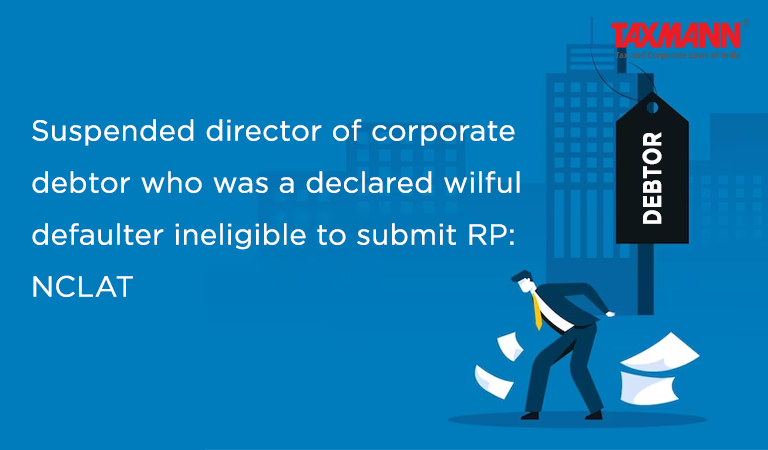Suspended director of corporate debtor who was a declared wilful defaulter ineligible to submit RP: NCLAT
- News|Blog|Insolvency and Bankruptcy Code|
- 2 Min Read
- By Taxmann
- |
- Last Updated on 18 March, 2023

Case Details: Athar Zia v. Anup Sood - [2023] 147 taxmann.com 493 (NCLAT-New Delhi)
Judiciary and Counsel Details
-
- Justice Ashok Bhushan, Chairperson & Dr Alok Srivastava, Technical Member
- Rishi Kapoor & Akhil Shankwar, Advs. for the Appellant.
- Namit Suri, Ms Surabhi Sinha & Ms Sonal Malik, Advs. for the Respondent.
Facts of the Case
In the instant case, in CIRP initiated against the corporate debtor, the appellant (i.e. suspended director of the corporate debtor) filed an application challenging observation of the Resolution Professional (RP). The RP had stated that the appellant was ineligible to submit a resolution plan as he had been declared as a wilful defaulter of Bank of India (BOI), which was the only financial creditor of the corporate debtor.
The Adjudicating Authority (NCLT) granted liberty to the appellant to make a representation before the Committee of Creditors (CoC) to decide the status of the appellant afresh in relation to being a defaulter.
The appellant, instead of filing representation before the CoC sent a letter with an expression of interest (EOI) for submitting a resolution plan. The bank gave further opportunity to the appellant to make payment of outstanding dues, however the appellant did not make the payment. Therefore, the Identification Committee identified the appellant as a wilful defaulter.
The Resolution Professional filed an application before the NCLT u/s 33 of IBC for initiation of liquidation against the corporate debtor and the said application was allowed by the impugned order of the NCLT. Thereafter, an appeal was made to the National Company Law Appellate Tribunal (NCLAT).
The appellant submitted that he was eligible to submit an expression of interest and a resolution plan. However, the NCLT allowed the application for liquidation without considering the appellant’s claim.
NCLAT Held
The NCLAT observed that the bank had declared the appellant a wilful defaulter, and therefore, he was clearly disqualified to submit a resolution plan under section 29A(b) of the IBC.
The NCLAT held that the contentions raised by the appellant for challenging the impugned order were without any substance. Therefore, no error was found in the impugned order passed by the Adjudicating Authority, allowing the application for liquidation. According, the appeal was to be dismissed.
List of Cases Reviewed
-
- Order passed by (NCLT – New Delhi) in C.A. No. 1233/2019, dated 21-2-2022 (para 13) affirmed.
List of Cases Referred to
-
- Athar Zia v. Bank of India [Writ Petition (Civil) No. 3404 of 2019, dated 8-7-2019] (para 6)
- Athar Zia v. Bank of India [Writ Petition (Civil) No. 9915 of 2021, dated 9-9-2021] (para 12).
Disclaimer: The content/information published on the website is only for general information of the user and shall not be construed as legal advice. While the Taxmann has exercised reasonable efforts to ensure the veracity of information/content published, Taxmann shall be under no liability in any manner whatsoever for incorrect information, if any.

Taxmann Publications has a dedicated in-house Research & Editorial Team. This team consists of a team of Chartered Accountants, Company Secretaries, and Lawyers. This team works under the guidance and supervision of editor-in-chief Mr Rakesh Bhargava.
The Research and Editorial Team is responsible for developing reliable and accurate content for the readers. The team follows the six-sigma approach to achieve the benchmark of zero error in its publications and research platforms. The team ensures that the following publication guidelines are thoroughly followed while developing the content:
- The statutory material is obtained only from the authorized and reliable sources
- All the latest developments in the judicial and legislative fields are covered
- Prepare the analytical write-ups on current, controversial, and important issues to help the readers to understand the concept and its implications
- Every content published by Taxmann is complete, accurate and lucid
- All evidence-based statements are supported with proper reference to Section, Circular No., Notification No. or citations
- The golden rules of grammar, style and consistency are thoroughly followed
- Font and size that’s easy to read and remain consistent across all imprint and digital publications are applied



 CA | CS | CMA
CA | CS | CMA
